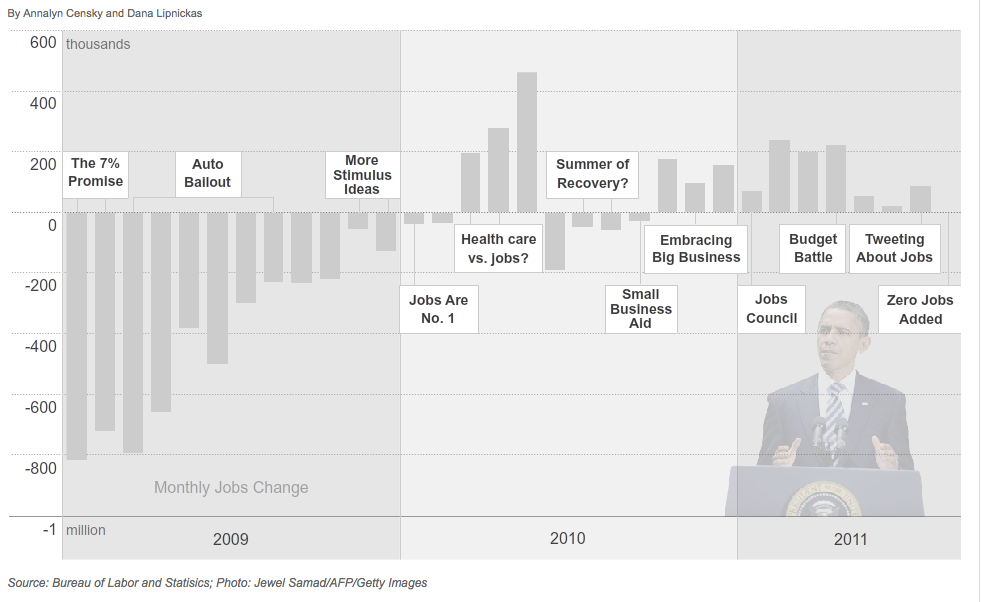Small Business
SBA Lending Statistics for Major Programs (as of 9/23/2011)
September 29, 2011This report provides statistics on Year to Date (YTD) SBA Business Loan Approval Activity comparisons for Fiscal Years 2009, 2010, and 2011 for the period ending 09/23/2011.
You Can’t Spend Your Way to Prosperity
September 8, 2011If ever there were proof that the government can’t spend its way to prosperity or job creation, this would have to be it:
Click the link to view the original chart on CNN so you can use the interactive features:
http://money.cnn.com/news/economy/storysupplement/obama_jobs_timeline/
What Recovery? Small Businesses are Still Suffering
August 23, 2011
Experts claim the economy is getting better, but average Americans have yet to claim the same. According to the March Discover Small Business Watch Survey, 54% of small business owners said the U.S. economy is getting worse. The sentiment seems to fly in the face of the stock market’s surge forward, as well as a declining unemployment rate. As of the latest March jobs report, unemployment ticked an inch downward to 8.8%. Sadly, the official unemployment rate does not count individuals that have been unemployed for an extended period of time or have given up looking for work altogether, traits that characterize many of the ACTUAL unemployed in this country. (Find out who the labor force consists of)
The unemployment rating system loses accuracy in prolonged recessions and therefore 8.8% is not valid, nor worth comparing to previous months. In an Interview with Reuters, Bill Cheney, the Chief Economist at John Hancock Financial Services stated, “It is always possible that as the job market improves, people will start looking again and the unemployment rate could go up.” That being said, the one true measure of the economy is the voice of the people.
improves, people will start looking again and the unemployment rate could go up.” That being said, the one true measure of the economy is the voice of the people.
As a member of the U.S. Chamber of Commerce, the Merchant Cash Advance Resource is constantly tuned in to the issues of small business owners. And guess what? We’re not hearing much positive feedback there either. The lending and capital markets continue to be a pressing factor, but federal, state, and local government regulations are stymieing innovation and expansion as well. From the Chamber, “With increasing uncertainty and government barriers threatening America’s economic recovery–Congressional leaders are reaching out to business owners to hear what is hindering their growth and what can be done to remove barriers.” (Watch the videos and interviews here)
In the face of discouraging news, access to capital is slowly making a comeback but not from the banks. Alternative financial firms providing a product known as a Merchant Cash Advance will buy your future credit card sale receivables in exchange for a big chunk of cash today. Different from a loan and becoming widely accepted, businesses all over the country are taking advantage of the most innovative form of financing available. In a true level playing field, ‘mom and pop’ shops are just as eligible as the major franchises to receive up to $250,000.
Next month, the experts could claim an unemployment rate of 0%. So long as the statistics fail to reflect reality, it becomes more frustrating for Americans who continue to live through a recession that never actually ended. High unemployment, scarce capital, and job killing regulations still plague commerce. We’re not experts ourselves, but if 54% of business owners testify that things are getting worse, they probably are. With the Dow at a 52 week high, now is a great time to sell…
– The Merchant Cash Advance Resource



 2009 made major changes for consumers but NONE for businesses. In an article by creditcards.com, titled “
2009 made major changes for consumers but NONE for businesses. In an article by creditcards.com, titled “
 Small business failure rates rose overall by 40% from 2007 to 2010. That’s an incredible increase but not surprising given the time period. So what does the data mean for an industry focused on banking the unbankable businesses?
Small business failure rates rose overall by 40% from 2007 to 2010. That’s an incredible increase but not surprising given the time period. So what does the data mean for an industry focused on banking the unbankable businesses?


























